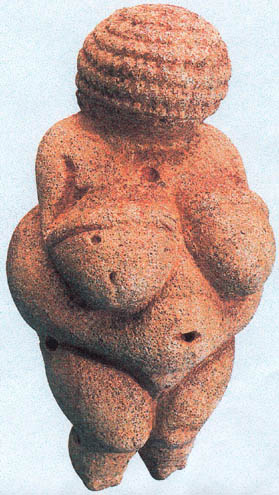In the past, the role of women has swung backwards and forwards between being worshiped and enslaved. Sometimes both at once. Some historians believe there were matriarchal societies in ancient human history, but others dispute the theory, arguing that it there is very little evidence. At the dawn of human existence, people were not able to write, so archaeologists have had free reign to 'fill in the blanks'. I personally like the idea that women were once the leaders of their communities, but part of me thinks it's nothing more than a nice fantasy.
Regardless of whether or not matriarchal societies existed, women were certainly revered for several of their feminine qualities. The ability to bleed and not die, the ability to bring forth life and to nurture it, and sometimes for their seductive power. To the left is pictured the 'Venus of Willendorf'. She is a paleolithic creation, approximately 30,000 years old. There have been many other similar figurines found originating from this period, so it seems clear that this particular image of a woman was of some cultural significance. Her large breasts and round belly appear to indicate that she was perhaps a symbol of fertility, perhaps even a representation of a goddess. She is among the first known pieces of artwork created, at a time when humans were supposedly only beginning to use stone tools and engage in spiritual behaviour.
 |
| The Venus of Willendorf. Believed to have been sculpted between 25000 and 28000 B.C |
Humans began learning to write a lot later, at around 3200 B.C. Since people were able to record events and mythologies after this time, there is a lot less guesswork involved in understanding the culture of the times. From this point until relatively recently, the vast majority of communities were patriarchal. Most women had very few legal rights, and were viewed as property themselves. They were not viewed as real citizens, and were represented by a male 'guardian', usually their father or their husband. Their role was to marry and to bear children.
| Ancient Egyptian couple |
| Young Spartan girl, running. c. 500 B.C |
Through the medieval and renaissance periods, women were mostly kept subordinate in their home and family environment. In Catholic Europe, women's legal rights were few to none. Noblewomen were often treated with more respect and exempted from doing chores and housework, but the poorer women usually worked very hard alongside the men, and were paid a lot less.
It may surprise you that East and south of Europe, Islamic law was more respectful of women. It is suggested that between the 7th and 18th centuries, women were given roles of importance in Islamic society, there were even female Muftis (legal advisors) and spiritual teachers. These sorts of rights were not afforded Western women until relatively recently. The Catholic Church persists to bar women from the clergy even today. Don't get me wrong, I understand they have their religious reasons, and I respect their right to their beliefs, but it doesn't stop me from disagreeing with them.
 |
| An 18th century depiction of Queen Boadicea by John Opie |
Modern feminism is helpful in campaigning for the rights of women across the globe, but does it go a little too far in some regards? My personal opinion is yes, they can go a little too far. Feminists today seem to portray men as evil and/or stupid. Admittedly, I am generalising, I do not assume this is all feminists, but it is the extremist feminists that seem to be making themselves heard. They appear obsessed by the continuing idea that women are oppressed, and they attempt to ridicule women who have taken on traditionally female roles of their own free choice. Essentially, modern feminism has become a contradiction of what feminism was initially intended to achieve. The goal of having equal rights with men has been twisted into having power men. Having to right to choose one's role in society has been twisted into the expectation that women should choose traditionally male roles and behave like males,
I don't consider myself a feminist because I like the equilibrium that masculine and feminine energy appears to have reached for the moment. Perhaps I am an equalist? I'm not sure. I believe that men and women are not the same, they are supposed to be different, but their roles in the world compliment each other. Trying to be more masculine is to me the very opposite of self-empowerment. Self empowerment comes from acknowledging and honouring who we truly are, whether we be masculine, feminine, or a little of both. Women are still discovering how they can use their more feminine strengths in a more diverse range of roles, some of which have been male dominated for a very long time. Our society is growing further and further from its patriarchal roots, and there are so many possibilities! Our recent ancestors have thrown open the floodgates of opportunity, and women living in western society today are perhaps able to live fuller lives than any other woman throughout history.
The chains are broken. It is up to us now to make the best of our freedom.
The chains are broken. It is up to us now to make the best of our freedom.

No comments:
Post a Comment